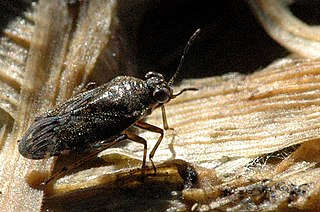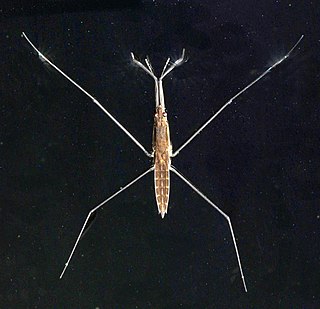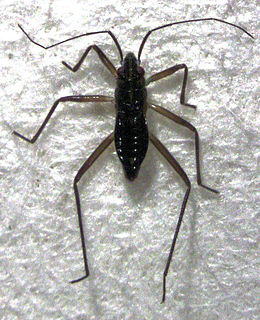Related Research Articles

Corixidae is a family of aquatic insects in the order Hemiptera. They are found worldwide in virtually any freshwater habitat and a few species live in saline water. There are about 500 known species worldwide, in 33 genera, including the genus Sigara.

Nepidae is a family of exclusively aquatic Heteropteran insects in the order Hemiptera. They are commonly called water scorpions for their superficial resemblance to scorpions, due to their raptorial forelegs and the presence of a long slender process at the posterior end of the abdomen, resembling a tail. There are 14 genera in the family, in two subfamilies, Nepinae and Ranatrinae. Members of the genus Ranatra, the most widespread and species-rich genus, are sometimes called needle bugs or water stick insects as they are slenderer than Nepa.

Ranatra is a genus of slender predatory insects of the family Nepidae, known as water scorpions or water stick-insects. There are around 100 Ranatra species found in freshwater habitats around the world, both in warm and temperate regions, with the highest diversity in South America and Asia. Fewer are found elsewhere, but include several African, some in North America, three from Australia and three from the Palearctic, notably the relatively well-known European R. linearis.

Saldidae, also known as shore bugs, are a family of insects in the order Hemiptera. They are oval-shaped and measure 2–8 mm (0.08–0.31 in) when mature. Typically they are found near shorelines or the marginal growths near freshwater bodies, estuaries, and sea coasts. They can flee by leaping or taking flight. There are about 350 recognized species with the majority from the Nearctic and Palearctic. Many species are found in the intertidal zone and both adults and nymphs of some species like Saldula pallipes can tolerate submergence at high-tide. Saldidae are predators and scavengers. They pass the winter through egg or adult diapause.

Water treaders, the superfamily Mesovelioidea, are insects in the order Hemiptera, the true bugs. They are semiaquatic insects that live in moist and wet habitat and on wet plant matter in several types of aquatic habitat.

Gerris is a bug genus in the family Gerridae.

Aquarius is a genus of water striders found predominantly in the northern hemisphere. Formerly a subgenus, Aquarius was elevated to generic rank in 1990 on the basis of phylogenetic analysis. These are among the world's largest water striders, with females averaging 12–17 mm (0.47–0.67 in) long and males roughly 10–30% smaller, depending on the exact species. An outlier is A. elongatus where both sexes typically are about 24 mm (0.94 in), roughly the same as certain Cylindrostethus, and second only to Gigantometra gigas.
Rhagovelia choreutes is a species in the infraorder Gerromorpha, in the order Hemiptera . The distribution range of Rhagovelia choreutes includes Central America and North America.

Nerthra is a genus of toad bugs in the family Gelastocoridae. There are at least 90 described species in Nerthra.

Buenoa is a genus of backswimmer. It was created by George Willis Kirkaldy in 1904 to include all species of Anisops from the Western Hemisphere with a two-segmented front tarsus in males, reserving the latter genus for Eastern Hemisphere species with a one-segmented front tarsus in males. It contains 69 described species.

Mesovelia is a genus of water treaders in the family Mesoveliidae. There are more than 30 described species in Mesovelia.

Limnogonus is a genus of water striders in the family Gerridae. There are 28 described species in Limnogonus.

Ochterus is a genus of velvety shore bugs in the family Ochteridae. There are more than 70 described species in Ochterus.

Hermatobates is a genus of wingless marine bugs placed as the sole genus in the family Hermatobatidae that are sometimes known as coral-treaders. They are quite rare and known only from coral reefs in the Indo-Pacific region. During low tide, they move over the water surface not unlike the more familiar water-striders around coral atolls and reefs and stay submerged in reef crevices during high tide.
References
- 1 2 "Rhagovelia Report". Integrated Taxonomic Information System. Retrieved 2018-05-03.
- 1 2 "Browse Rhagovelia". Catalogue of Life. Retrieved 2018-05-03.
- 1 2 "Rhagovelia". GBIF. Retrieved 2018-05-03.
- 1 2 "Rhagovelia Genus Information". BugGuide.net. Retrieved 2018-05-03.
- 1 2 3 Padilla-Gil, Dora N.(2009) "Three new species of Rhagovelia in the R. armata group (Heteroptera: Veliidae) from Colombia" Aquatic Insects: International Journal of Freshwater Entomology 31(3): 199-211. DOI:10.1080/01650420902797993
- 1 2 3 4 Padilla-Gil, Dora N. (2011). "Four new species of Rhagovelia in the robusta group from Colombia (Hemiptera: Heteroptera: Veliidae)." Zootaxa 2975: 35-46.
- 1 2 Padilla-Gil, Dora N. (2012). "Two new species of Rhagovelia from Colombia (Hemiptera: Heteroptera: Valiidae) with revised keys to the Colombian species in the torquata and robusta groups." Zootaxa 3251: 57-63.
- ↑ Padilla-Gil, Dora N. (2011). "A new Rhagovelia in the armata group from Colombia (Hemiptera: Heteroptera: Veliidae)." Zootaxa 2784: 33-38.